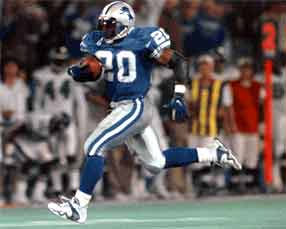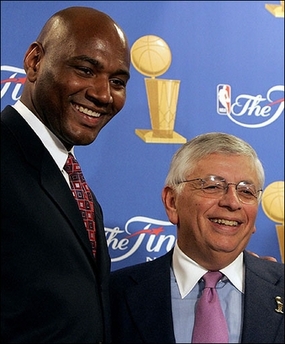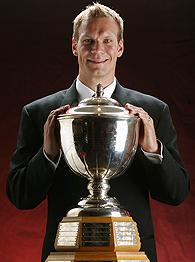The Red Wings, perhaps rolling the dice a bit, nabbed Bertuzzi from Florida at the trading deadline in 2007. It was a risk, for sure, as he had missed most of the season with a bad back. A back injury is one of the few maladies that professional athletes suffer that common folk can relate to. Most of this country, I'm convinced, has a tricky back in some way, shape, or form. And those who do -- imagine lacing on a pair of skates. No -- I mean, just lacing up the skates. Forget about playing hockey, right?
Bertuzzi wasn't anything near his old self with Detroit, though he gave it a shot. There were brief moments of the Bertuzzi who terrorized the NHL six, seven years ago while playing for Vancouver. But mainly he was a laboring, one step-too-slow forward who was no more than a fourth liner at best. Yet the Red Wings didn't give up too much to get him, so there really was no harm, and thus, maybe not that big of a risk to begin with.
But Todd Bertuzzi didn't "dog it" while he was in Detroit. He just wasn't physically capable. So let's get that straight, from the get go.
Bertuzzi left for Anaheim last summer, before the Red Wings really had a chance to seriously discuss bringing him back -- which they were willing to do, if the price was right. His back got better, and he scored 14 goals with the Ducks in '07-'08.
Now Bertuzzi has been waived by the Ducks, making him an unrestricted free agent beginning tomorrow, when the NHL's free agency extravaganza opens its doors first thing in the morning (actually, at 12:01 a.m.). The Red Wings, it's suspected, might be an interested suitor.
This is a polarizing issue, I can tell already. The early retorts are either brimming with optimism about a second Bertuzzi term in Detroit, or run along the lines of, "Ugh -- do you REALLY want to go down that path again?"
I guess I fall under the first category.
A rare, "vintage" Bertuzzi moment during last season's playoffs (ironically, that's Brad Stuart he's crunching into the boards)
There's no such thing as having too much depth, or of being too hard to play against in the playoffs. Or of having too many guys who can put the puck in the net on occasion. Or of having a veteran or two on the roster who's never won a Stanley Cup and is famished.
Bertuzzi fits all of the above.
Let me also insert here some words about super Swede Mats Sundin -- also a free agent, and who's being courted openly by Montreal. The Red Wings are rumored to have interest in Sundin, too. The whole Swedish connection and all. Once, the Red Wings were a haven to Russian-born players. Now they've shifted that to the west a little bit, to Sweden.
But forget about Sundin signing with the Wings. I just don't see it happening. He may not even leave Toronto, if you really want to know. Some say he might consider Montreal because it's a Canadian city. The lure of all the Red Wing's countrymen appears to not be enough. The riches one can earn from playing hockey in Detroit may not, for a change, be persuasive enough for a star to leave his former team. How dare he!
So back to Bertuzzi.
For what it's worth, Bertuzzi enjoyed his brief time in Detroit; he has family in the Windsor area. He was treated well by the fans. And the team was a fluke goal away, perhaps, from appearing in the Cup Finals. Maybe from winning the whole thing.
It didn't work out last year -- Bertuzzi and the Red Wings. But it was no one's fault, really. And it certainly wasn't because the player "dogged it."
Good thing we don't place our teams' personnel decisions in the hands of those with cell phones cruising down the freeway.











